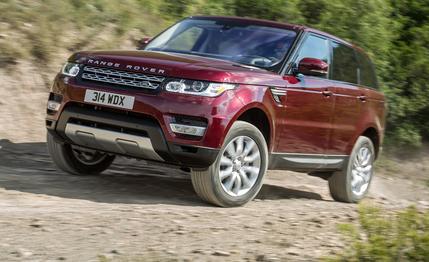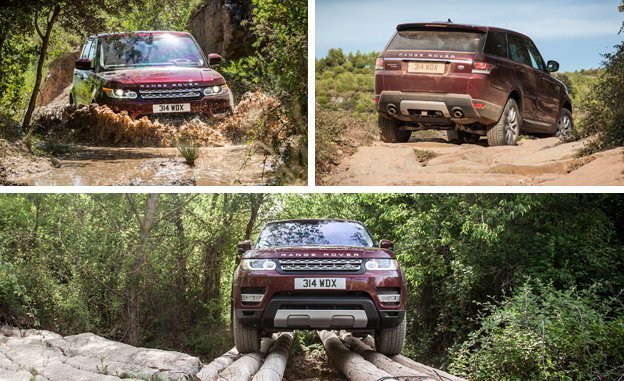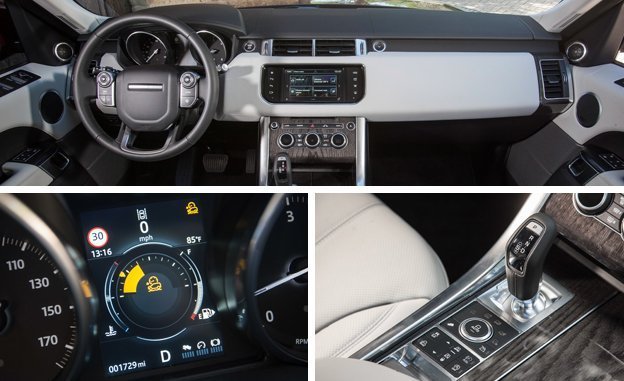
 First Drive Review
First Drive Review
Before Land Rover allowed us to drive the new diesel-powered Range Rover Sport, we were told that no one in a single focus group identified its new Td6 powerplant as a diesel engine. “Sure,” we thought, “but these are probably the same kind of rubes who might bite into a red onion thinking it’s an apple.”
Arriving at dealerships this fall, the new 3.0-liter turbo-diesel V-6 will command a $1500 premium over the gasoline-powered supercharged V-6 Range Rover Sport. Dubbed Td6, it makes 254 horsepower at 4000 rpm and 440 lb-ft of torque at 1750 rpm. Interestingly, this 60-degree V-6 is a design that dates back to 2004 and the days when Ford owned Land Rover—in fact, Ford still builds the engine for Land Rover even though it doesn’t power any product with a Blue Oval.


The Td6 powers about 90 percent of Land Rovers in Europe; to cross the Atlantic, the engine had to be cleaned up with a selective catalytic reduction (SCR) system that takes a urea-based fluid and injects it into the exhaust flow to reduce NOx emissions. To further reduce NOx emissions, the engine uses low-pressure exhaust-gas recirculation that runs through an engine-mounted cooler before reentering the combustion chamber.
To give some credit to the focus groupies, there actually aren’t too many clues that this particular Range Rover Sport uses diesel power. The most noticeable tells are a small Td6 badge on the hatch and a light ticking from under the hood. Yet even from outside it doesn’t sound much louder than some direct-injected gasoline engines.
There aren’t very many signs in normal everyday driving, either. There’s a 4800-rpm redline and the power delivery definitely favors the low end, while running through the eight-speed automatic’s first couple of gears reveals that the party is over by 4000 rpm. But keep it below 4000 rpm and the boost comes on in a smooth and very nearly effortless manner, even at part throttle.
At full throttle, Land Rover claims a believable zero-to-60-mph time of 7.1 seconds, a couple of tenths behind the stated sprint for the supercharged gasoline V-6. To the 15 to 20 percent of Range Rover Sport customers who are expected to opt for the diesel, the fuel-economy numbers of 22 mpg city and 28 highway are what will be really important—the gas V-6 returns 17 and 23. The Sport’s 23.5-gallon tank makes an uninterrupted 658-mile drive possible in the diesel at the rated highway mileage.


Those 600-plus-miles would certainly be pleasant ones. An acoustic windshield, double-paned side glass, unique engine mounts, and a new firewall design muffle the clatter endemic to diesels. From the driver’s seat, there’s simply no audible clue that the engine is transforming compression ignition into propulsion. Alright, we’ll admit it. Whether they know it or not, the folks who attended those clinics for free scones and a $20 Lululemon gift card got this one right: This is a seriously quiet, refined, and subtle diesel.
In bringing over the diesel engine, Land Rover has left the rest of the Sport pretty much alone. The SUV retains its evocative leather and shiny wood, off-road prowess, a high-/low-range transfer case, and the standard air suspension that lifts or lowers the vehicle at the push of a button. As part of the Sport’s 2016 updates, new this year is All-Terrain Progress Control (ATPC). When in use, ATPC lets the Land Rover crawl over obstacles or through slippery terrain without the help of the driver. Basically, you set the speed using the cruise-control buttons on the steering wheel and ATPC figures out the rest. It even works to control speed while descending, but unlike hill-descent control, ATPC operates only at very low speeds.
The new diesel is available in the Sport’s SE and HSE trim levels, and it opens at $67,445. That’s a not-insignificant chunk of money, but the larger Range Rover diesel with the same engine starts at more than $87,000, making the sweet Sport Td6 seem like a bargain, relatively speaking.